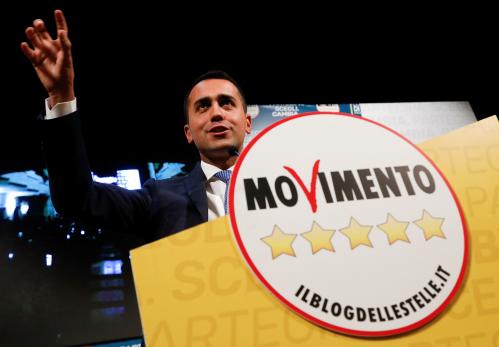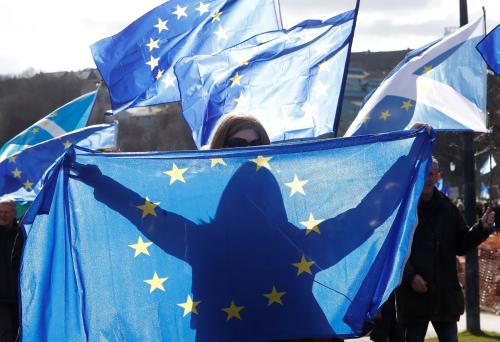Earlier this month, as world leaders gathered in Paris to honor the 100th anniversary of World War I’s end, President Macron of France declared that “Europe almost committed suicide” during the war, and he attributed much of the blame to countries that put their own nationalistic interests ahead of everybody else. Two days later, U.S. President Trump tweeted that Macron “was just trying to get onto another subject,” since “there is no country more nationalist than France.”
Barely 20 years after the end of World War I, world powers began battling over their nationalistic pursuits again. When peace was finally achieved, liberal democracies created an international order that reflected their shared values that were to be implemented through institutions, treaties, and organizations like the United Nations, the WTO, and the European Union. Two decades after the collapse of communism, nationalism is back with a vengeance.
The nationalist resurgence
Populists like President Trump are raising serious challenges for the international liberal order. The U.S. has upended world trade relations, declared NATO obsolete, withdrawn from UNESCO, and defunded the United Nations Population Fund. Hungary and Poland have challenged the notion of liberal democracy, and the U.K. has voted to leave the European Union altogether. President Erdoğan has eroded Turkey’s democratic and secular foundations, while Venezuela has challenged both the world order and the development recipes it underlies. A new political narrative has emerged, worldwide, which focuses on nationalism and views international institutions as threats to national sovereignty and identity.
Development organizations like the World Bank and the IMF have been the institutional bedrocks of the financial architecture of the international liberal order, ready to intervene during financial crises and to provide funds and everyday assistance to improve people’s lives. As they were designed to solve problems of sovereign states, whether democratic or authoritarian, development organizations face today a moral dilemma: should they work with populist governments, which increasingly question the very existence of the liberal order and its fundamental values, like the rule of law, human rights, and solidarity?
They should—but with two caveats. First, they should increase the transparency of the relationship between donors, recipients, and the institution. Second, they should require the respect of key moral values as the conditionality for providing funds and assistance.
Not without conditions
Development organizations should radically increase the transparency of their collaboration with donors and recipients of aid. Among donor countries, the United States did not match its anti-globalization stance in April 2018 when it supported a $13 billion capital increase for the World Bank. Similarly, several populist governments have been pragmatic in working with development organizations, sometimes despite the political narratives that propelled them to power. Jair Bolsonaro, who recently won the presidential elections in Brazil, campaigned on a typical Washington Consensus economic agenda, asserting that he would like to push for free-market reforms similar to those introduced by Chile in the 1970s. In India, a religious populist government has been pushing for neoliberal free-market reforms since its inception in 2014. In Europe, Greek Prime Minister Alexis Tsipras first won elections on an anti-globalization socioeconomic agenda, and then embraced the liberal-democratic reforms pushed by the IMF, the European Central Bank, and the European Commission.
By making the relationship with populist governments more transparent, development organizations can keep the international community on alert about any potential backsliding, while continuing to work to improve the lives of all people, especially the poor. The choices and compromises that World Bank President Jim Kim and IMF Managing Director Christine Lagarde make should be publicly debated with the stakeholders of their respective organizations, as well as in the broader development community, since their implications are far and broad. Otherwise, decisions taken in the obscurity of their control rooms might be seen as being driven by the organizational instinct of self-preservation.
Development organizations should also ask for value-based conditionalities from populist governments that need their support. In fact, their work is not compatible with many of the values espoused by populists and, by willy-nilly aiding such governments, they might help them erode liberal institutions. Using Harvard economist Dani Rodrik’s well-known trilemma, democracy, globalization, and national sovereignty cannot all exist at the same time. If populist governments want international support, they should be willing to accept some value-based conditionalities that limit their sovereignty, help preserve their liberal democracy and the values it embodies, and implicitly legitimize economic globalization.
Regional organizations may actually provide the multilaterals useful pointers. The European Union, for example, was founded on the values of freedom, dignity, pluralism, non-discrimination, tolerance, justice, and solidarity. These are values that many European populists question, if not reject outright. Hungarian Prime Minister Viktor Orbán recently won reelection championing an illiberal democracy, while using European Commission’s funds to promote neoliberal economic reforms. However, according to the OECD, the total official development assistance (ODA) received by Hungary from multilateral development agencies such as the European Commission or the World Bank increased by 70 percent since Orbán first took power in 2010. The European Parliament voted to sanction Hungary for breaking EU rules on democracy, civil rights, and corruption. The EU has also been monitoring the constitutional transformations undertaken by the Law and Justice party in Poland, and it launched Article 7 disciplinary measures after deciding that the country had repeatedly compromised judiciary independency. Similarly, Poland’s ODA increased by over 1,300 percent since 2015, when the Law and Justice party returned to power with a parliamentary majority. Following a European Court of Justice’s ruling, the polish government last week backtracked on controversial reforms it made to lower the retirement age of Supreme Court judges. In the Western Hemisphere, the Organization of American States has been monitoring the situation of Venezuela’s Chavez and Maduro regimes for years. It is now openly advocating for regime change, following the “democratic clause” in its charter. Development organizations like the World Bank and the IMF could follow suit and link their financial assistance to similar value-based conditionalities.
Once more, an appeal to morality
The architecture of the international liberal order must be modernized using a combination of increased transparency and a razor sharp focus on moral and ethical values. Otherwise, the world could suffer the sort of mayhem that happened during the two World Wars. As long as global interdependence continues to increase, governments of all shapes and sensibilities will need to work together to solve global problems, using the institutions that the 70-year old liberal order created for precisely this purpose. Development organizations should work with all polities, provided they preserve the moral foundations of the liberal order. Until the world develops an alternative global arrangement that reflects a new consensus, the international liberal order is the best hope for shared prosperity.
The Brookings Institution is committed to quality, independence, and impact.
We are supported by a diverse array of funders. In line with our values and policies, each Brookings publication represents the sole views of its author(s).






Commentary
How should development organizations work with populist governments?
November 29, 2018